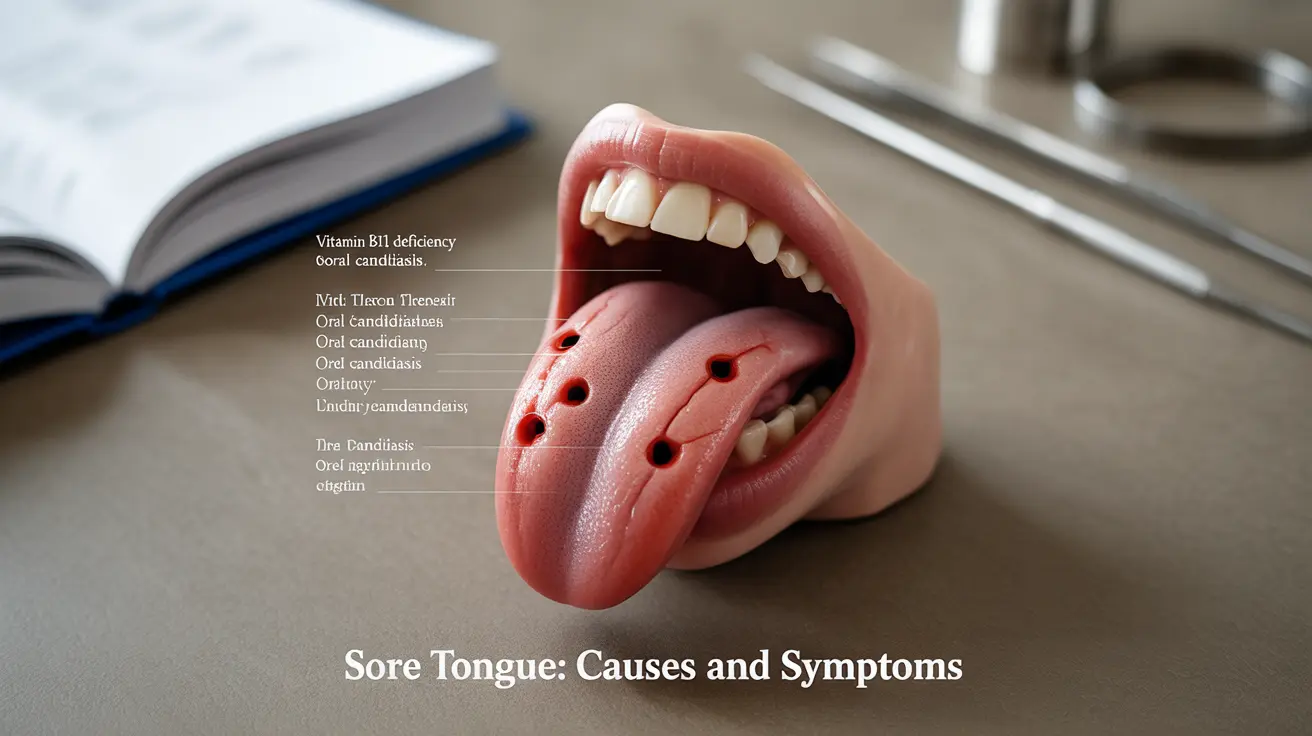A sore tongue can be an uncomfortable and disruptive condition that affects eating, speaking, and daily comfort. Whether caused by injury, infection, or underlying health issues, understanding effective treatment options is crucial for finding relief. This comprehensive guide explores various treatment approaches and helps you determine when professional medical attention may be necessary.
Understanding Sore Tongue Causes
Before pursuing treatment, it's important to identify potential causes of tongue soreness. Common triggers include:
- Physical trauma from biting or burning
- Vitamin deficiencies (particularly B12 and folate)
- Oral infections
- Food allergies or sensitivities
- Geographic tongue
- Certain medications
Immediate Relief Strategies
When experiencing tongue discomfort, several immediate relief measures can help manage pain and promote healing:
Salt Water Rinses
A warm salt water rinse can help reduce inflammation and create an environment less favorable for bacteria. Mix 1/2 teaspoon of salt in a cup of warm water and gently swish for 30 seconds.
Cold Therapy
Sucking on ice chips or applying cold substances can temporarily numb the area and reduce inflammation. This method is particularly effective for burns or physical injuries to the tongue.
Over-the-Counter Solutions
Several OTC products can provide effective relief for a sore tongue:
- Oral pain gels containing benzocaine
- Antimicrobial mouth rinses
- Vitamin B12 supplements (if deficiency is suspected)
- Oral antihistamines (for allergic reactions)
Natural and Home Remedies
Many natural remedies can complement traditional treatments:
Honey Application
Raw honey's natural antibacterial properties can help soothe and heal a sore tongue. Apply a small amount directly to the affected area.
Aloe Vera
Pure aloe vera gel can provide cooling relief and support healing. Ensure you're using food-grade aloe vera products specifically designed for oral use.
Prevention Strategies
To avoid recurring tongue soreness, consider these preventive measures:
- Maintain good oral hygiene
- Avoid very hot foods and beverages
- Use a soft-bristled toothbrush
- Stay hydrated
- Address any vitamin deficiencies through diet or supplements
When to Seek Medical Care
While many cases of sore tongue resolve with home treatment, certain symptoms warrant professional attention:
- Persistent pain lasting more than two weeks
- Severe swelling or difficulty breathing
- Unusual patches or growths
- Bleeding that won't stop
- Accompanying fever or severe pain
Frequently Asked Questions
What are the most effective home remedies for treating a sore tongue?
The most effective home remedies include salt water rinses, cold therapy, honey application, and aloe vera gel. These treatments can reduce inflammation, provide pain relief, and support natural healing processes.
When should I see a doctor for a sore tongue that won't heal?
Seek medical attention if your sore tongue persists for more than two weeks, is accompanied by severe swelling or bleeding, or if you develop fever or difficulty breathing. These symptoms could indicate a more serious underlying condition requiring professional treatment.
How can vitamin deficiencies cause tongue soreness and how are they treated?
Vitamin B12 and folate deficiencies can cause tongue soreness and inflammation. Treatment typically involves supplementation under medical supervision and dietary modifications to include more vitamin-rich foods.
Which over-the-counter treatments can help relieve pain from a sore tongue?
Effective OTC treatments include oral pain gels with benzocaine, antimicrobial mouth rinses, and oral antihistamines for allergic reactions. These products can provide temporary relief while the underlying cause heals.
What foods or habits should I avoid to prevent irritating a sore tongue?
Avoid spicy, acidic, or very hot foods and beverages. Limit alcohol and tobacco use, and avoid rough-textured foods that might further irritate the tongue. Practice good oral hygiene and use a soft-bristled toothbrush.




